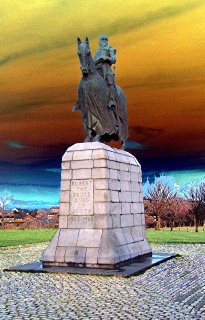The State Of The Union

It has often been said that the Scots and the English are the best of friends and the worst of enemies. Indeed it is strange that two such different countries have been bound together for so long. It's 300 years since the Act of Union with England, and the creation of the United Kingdom, and now people are beginning to ask, what does the Union mean to us today, and is it still necessary or relevant to the needs of a modern Scotland?
When the decision was taken by a group of unelected noblemen to dissolve the Scottish parliament 300 years ago, it was said that they had been 'Bought and Sold for English Gold'. For centuries, the Scots had resisted any attempt to be brought under English rule, many battles were fought, more lost than won, but the will to be free and autonomous has always run deep in the Scottish psyche, and from that passion sprung forth documents like the Declaration of Arbroath : 'for, as long as but a hundred of us remain alive, never will we on any conditions be brought under English rule. It is in truth not for glory, nor riches, nor honours that we are fighting, but for freedom - for that alone, which no honest man gives up but with life itself.’
Extract from the Declaration of Arbroath. The declaration of Arbroath is thought to have been the inspiration behind the American declaration of independence.
However, the modern Act of Union was drafted at a time when it was no longer acceptable for England to rule in dominion over Scotland and strip its assets, both monetary and human. It was devised as a partnership, but any partnership between a large nation and a small nation will undoubtedly be troublesome, as the small nation will never feel it has enough involvement, and the large nation will feel that the smaller has too much involvement. It is also extremely difficult to govern such a partnership, as what seems like a good measure for the south of England is most decidedly not a good measure for the North Of Scotland. This is where, in my opinion, the Union begins to creak. Margaret Thatcher knew that Scots would never vote for her in great droves, as we have always been something of a liberal country, so she opted to keep her core electorate happy, and closed down steelworks and shipyards and all of Scotland's manufacturing industry, moving them piecemeal to the South of England. She destroyed this country by grinding it slowly and painfully into the ground. The conundrum nowadays is that the Labour government has given us back our own parliament for devolved issues i.e. everything bar our own fiscal autonomy and control of defence. The killer here is that Scottish MSP's in Edinburgh can vote on matters of Scottish policy and English MP's no longer have a say on this. Fair enough, you may say, but in Westminster, Scottish MP's can vote on English policy matters and help the government force through unpopular measures. This is the cryptically titled 'West Lothian Question'. In the last general election, the Conservatives would have won had it not been for the Labour MPs returned from Scotland and Wales. Now that the Scottish parliament Elections are coming up in may, and the Scottish National Party are ahead in the opinion polls, Labour are scaremongering about how terrible it would be if the Nats were to get in, and sever ties with the UK. How taxes would go up, and there would be mass unemployment and so forth. I think that it's fairly obvious why they want to hang on to us. They would never win another election down south without us.
Plus Gordon Brown (the chancellor of the exchequer) is a Scot, and is set to succeed Tony Blair as Prime Minister, but he will only have a short tenure before the next election. In a recent poll (done by Frank Luntz, of all people?!?) 70% of English voters responded that they would not vote for Gordon Brown because he is Scottish. I think that is the death knell for the Union, if someone can't attain the nation's highest office because of the country he hails from.
My own personal view is that there will never be a better time to go it alone. We have such a rich history, and world legacy that it would be unthinkable for us to fail as an autonomous nation. From Scotland, the country whose peoples have brought us the telephone, television, penecillin, chloroform, tarmac (asphalt), the tyre and the doctrine of capitalism itself, it would be a great opportunity to step out from the shadow of our nearest neighbours, and be a confident nation again, as part of the vibrant European Union. Most importantly, we have the will to make it work. I know which box I'll be crossing in May...

 This is Steven Mason, (First Scot on the moon) ;-p Sadly, it was only his dream too! I absolutely live for music. I know that's such a lame thing to say, but it's true. It seems to bring order to my life, and at the moment the glue that's holding me together is The Beta Band. I know I probably spend way too much time banging on about how great all things Scottish are, (When I'm undoubtedly looking through tartan tinged specs) but these guys truly deserve it. Not hugely famous, despite being quite prominently namechecked and played in hollywood movie 'High Fidelity', they quite simply are rock chocolate.
This is Steven Mason, (First Scot on the moon) ;-p Sadly, it was only his dream too! I absolutely live for music. I know that's such a lame thing to say, but it's true. It seems to bring order to my life, and at the moment the glue that's holding me together is The Beta Band. I know I probably spend way too much time banging on about how great all things Scottish are, (When I'm undoubtedly looking through tartan tinged specs) but these guys truly deserve it. Not hugely famous, despite being quite prominently namechecked and played in hollywood movie 'High Fidelity', they quite simply are rock chocolate.

